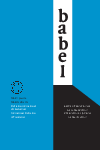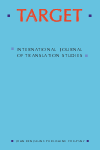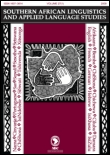
Cadernos de Traducao
Scope & Guideline
Bridging cultures through innovative translation scholarship.
Introduction
Aims and Scopes
- Interdisciplinary Approaches to Translation:
The journal explores translation from multiple disciplinary perspectives, including linguistics, cultural studies, and technology, enhancing the understanding of translation's role in societal contexts. - Audiovisual Translation:
A significant focus is placed on audiovisual translation, covering subtitling, dubbing, and the translation of taboo language in media, reflecting the evolving nature of communication in the digital age. - Cultural and Linguistic Contexts:
The journal examines the interplay between translation and cultural identity, particularly in the context of minority languages, indigenous communities, and the impacts of globalization on translation practices. - Educational Practices in Translation:
Cadernos de Tradução emphasizes the pedagogical aspects of translation, investigating effective teaching methodologies, translator training, and the development of competencies necessary for professional practice. - Translation Quality and Assessment:
The journal addresses issues related to translation quality, evaluation methods, and the impact of technology on translation processes, aiming to improve standards within the profession.
Trending and Emerging
- Taboo Language and Swearing in Translation:
There is a growing focus on the translation of taboo language and swearing in various media, reflecting societal changes and the importance of cultural context in translation practices. - Technology and Translation:
The integration of technology in translation, particularly concerning machine translation, post-editing, and the use of digital tools, has become a prominent theme, showcasing the journal's alignment with industry advancements. - Cultural Identity and Translation:
Emerging discussions around cultural identity, particularly in relation to marginalized voices and minority languages, indicate a shift towards understanding translation as a form of cultural negotiation and representation. - Translation and Gender Studies:
An increasing number of studies focus on the intersection of translation and gender, exploring how translation practices impact gender representation and the role of female translators in the industry. - Cognitive Approaches to Translation:
Recent trends also emphasize cognitive aspects of translation, including the mental processes involved in translation tasks, suggesting a shift towards understanding the translator's cognitive load and decision-making.
Declining or Waning
- Historical Translation Practices:
There has been a noticeable decline in publications focused on historical translation practices and analyses of older texts, suggesting a shift towards contemporary and practical applications of translation. - Translation of Classical Literature:
Research specifically dedicated to the translation of classical literature, while still relevant, has seen a reduction in frequency, indicating a potential move towards exploring modern and diverse literary forms. - Translation of Non-Literary Texts:
The exploration of non-literary texts, such as technical or legal translations, has diminished, as the journal increasingly prioritizes the intersection of translation with cultural and audiovisual contexts.
Similar Journals

Babel-Revue Internationale de la Traduction-International Journal of Translation
Uncovering Innovative Perspectives in Translation StudiesBabel - Revue Internationale de la Traduction - International Journal of Translation, published by John Benjamins Publishing Co, is a leading scholarly journal that has established itself as a critical platform for research in the fields of translation studies, linguistics, and communication. Since its inception in 1955, Babel has provided a forum for academic discourse and has adapted through converged years to continuously reflect the evolving landscape of translation theory and practice. The journal is recognized for its high impact, achieving a Q1 ranking in Linguistics and Language and Q2 in Communication, making it relevant for both researchers and practitioners seeking to contribute to this dynamic area of study. With significant Scopus rankings in various categories, Babel is instrumental in promoting innovative research and fostering multidisciplinary dialogue. Although it does not offer open access, the journal is accessible through numerous academic institutions worldwide, ensuring that vital insights into translation practices and theories are disseminated effectively. Researchers, professionals, and students alike will find a wealth of knowledge and groundbreaking perspectives within its pages, making Babel an essential resource in the field.

Eurasian Journal of Applied Linguistics
Exploring Linguistic Connections and Cultural NarrativesThe Eurasian Journal of Applied Linguistics, published by Hacettepe University, ELT Department, is a distinguished open-access journal that has been contributing to the fields of linguistics and language education since 2015. With a focus on bridging cultural and linguistic understandings across Eurasia, this journal provides a platform for researchers, educators, and practitioners to share cutting-edge studies, innovative pedagogical strategies, and insightful analyses. The journal holds notable Scopus rankings within the Language and Linguistics (Rank #155/1088, 85th Percentile) and Education (Rank #696/1543, 54th Percentile) categories, evidencing its growing impact within the academic community. As it prepares to converge into a new phase from 2018 to 2024, the Eurasian Journal of Applied Linguistics aims to uphold its mission of fostering interdisciplinary dialogue and advancing knowledge in applied linguistics and its related fields.

Target-International Journal of Translation Studies
Exploring the Depths of Communication and LinguisticsTarget - International Journal of Translation Studies, published by John Benjamins Publishing Co, stands as a leading academic forum in the fields of translation studies, communication, and linguistics. Established in 1989, this prestigious journal has successfully evolved, boasting a Q1 classification in 2023 within both Communication and Linguistics and Language categories, reflecting its significant impact and influence in these disciplines. With an impressive positioning in the Scopus ranks, it is recognized as one of the top journals in its field, being placed in the 88th percentile for Language and Linguistics, and in the 87th percentile for Linguistics and Language within the Social Sciences. Its rigorous scholarly contributions foster a greater understanding of translation practices, theories, and methodologies, making it an essential resource for researchers, professionals, and students alike. While it does not currently offer open access, its comprehensive articles and studies greatly enrich discussions and advancements in translation and communication studies.

MACHINE TRANSLATION
Advancing knowledge in the realm of language technology.MACHINE TRANSLATION, published by Springer, is a premier academic journal dedicated to the interdisciplinary fields of Artificial Intelligence, Linguistics, and Software Development. With its origins dating back to 1989, the journal has played a crucial role in disseminating cutting-edge research and advancements in machine translation technologies. The journal holds a distinguished Q3 ranking in Artificial Intelligence and Q1 in Linguistics and Language for 2023, underlining its relevance and impact in the linguistic and computational research communities. Despite coverage discontinuation in Scopus, it continues to have impressive rank positions in various categories, including 31st percentile for Language and Linguistics and 112th for Artificial Intelligence. Researchers, professionals, and students can access a wealth of impactful articles that explore the latest methodologies, tools, and applications in the domain of machine translation, solidifying its importance for anyone vested in the future of language technology.

REVISTA DE FILOLOGIA DE LA UNIVERSIDAD DE LA LAGUNA
Advancing linguistic insights from the heart of the Canary Islands.REVISTA DE FILOLOGIA DE LA UNIVERSIDAD DE LA LAGUNA is a prestigious academic journal dedicated to advancing the fields of linguistics and language studies. Published by the Universidad de la Laguna in Spain, this journal serves as an essential resource for researchers, professionals, and students alike, offering critical insights and scholarly articles that contribute to the understanding of language and its intricacies. With its inclusion in the Q3 category of the 2023 Linguistics and Language rankings and Scopus rankings, it demonstrates a growing impact within the academic community, while maintaining a commitment to fostering dialogue and disseminating valuable research. As a platform for innovative ideas and diverse perspectives, the journal aims to bridge theoretical approaches and practical applications, ensuring that readers are well-equipped to engage with contemporary issues in linguistics. Although it is currently not open access, the journal remains an influential contributor to the language and linguistics sectors, operating from the picturesque Canary Islands, enhancing its appeal not only as a scholarly resource but also as a culturally rich platform for academic expression.

Southern African Linguistics and Applied Language Studies
Connecting Linguistics with Southern African ContextsSouthern African Linguistics and Applied Language Studies is a prestigious journal dedicated to the exploration and analysis of linguistics and applied language studies within the Southern African context. Published by Taylor & Francis Ltd, this esteemed journal has established itself as a significant platform for scholars and practitioners since its inception in 2003. With an impressive Q2 ranking in the Linguistics and Language category and a current Scopus rank of #430 out of 1167, it occupies a vital position in the academic landscape, appealing to a diverse readership keen on linguistic research, language policy, and applied linguistics. While the journal is not currently open access, it provides comprehensive insights and scholarly articles that foster understanding and innovation in linguistic practices and language education. As of 2024, the journal continues to deepen its impact through rigorous peer-review and a commitment to advancing knowledge, making it a key resource for researchers, educators, and students seeking to navigate the complexities of language within the Southern African region and beyond.

Cadernos de Letras da UFF
Cultivating Knowledge in Literature and LanguageCadernos de Letras da UFF is a prominent academic journal published by the Department of History at the Federal University of Fluminense in Brazil. Since its transition to Open Access in 2014, it has fostered a spirit of collaboration and dissemination in the field of Literature and Linguistics, welcoming contributions that explore various aspects of literary studies, historical literature contexts, and linguistic phenomena. With a commitment to quality and academic rigor, the journal serves as a vital resource for scholars, practitioners, and students engaged in the humanities. The journal is dedicated to the advancement of knowledge through innovative research and critical analyses, making it an essential platform for sharing ideas with a global audience. The journal is based in Niterói, RJ, Brazil, and is indexed in various academic databases, enhancing its visibility and impact within the scholarly community.

Suvremena Lingvistika
Connecting Scholars and Ideas Across Linguistic Landscapes.Suvremena Lingvistika is a distinguished open-access journal published by the Croatian Philological Society, dedicated to advancing research in the field of linguistics and language. Since its establishment, the journal has been pivotal in promoting scholarly dialogue within the linguistics community, especially among researchers and academics in Croatia and beyond. With an ISSN of 0586-0296 and an E-ISSN of 1847-117X, the journal has transitioned to an open-access model since 2007, ensuring that research is freely accessible to all. As of 2023, it holds a respectable Q3 ranking in the Linguistics and Language category, reflecting its potential contribution to the field. The journal's scope encompasses a wide array of linguistic disciplines, encouraging both theoretical and empirical studies. Supportive of new research, Suvremena Lingvistika aims to foster innovative approaches and methodologies in linguistics, making it an essential resource for students, researchers, and professionals eager to explore the complexities of language. With its ongoing publication until 2024, it continues to shape the linguistic landscape, providing valuable insights and fostering collaboration among scholars globally.

Romanica Olomucensia
Illuminating New Paths in Romance Languages and LiteratureRomanica Olomucensia is a distinguished open-access academic journal published by Palacky University, Department of Romance Philosophical Faculty in the Czech Republic. With its commitment to fostering advanced research in the fields of Literature and Literary Theory as well as Linguistics and Language, this journal aims to provide a platform for scholars, researchers, and students to share their findings and insights. Since its inception, Romanica Olomucensia has consistently been recognized for its quality, securing a position in the Q2 category in the literature domain and achieving a Q3 ranking in linguistics per the 2023 category quartiles. The journal is indexed in Scopus, reflecting its standing in the academic community, with impressive ranks in various arts and humanities disciplines. It has been an open-access journal since 2018, promoting unrestricted access to all its publications, thus enhancing global academic outreach. With a focus on innovation and interdisciplinary studies, Romanica Olomucensia serves as an essential resource for anyone interested in the dynamic interplay of language and literature.

LFE-Revista de Lenguas para Fines Especificos
Catalyzing Dialogue in Language Studies WorldwideLFE-Revista de Lenguas para Fines Especificos is a distinguished academic journal focused on the field of applied linguistics and language education, published by UNIV LAS PALMAS GRAN CANARIA, SERV PUBL & DIF CIENT PARQUE CIENT. Established in 1993, this Open Access journal promotes the dissemination of research on specific purposes in language studies, making it an invaluable resource for researchers, educators, and students alike. Based in Spain, it serves an international audience interested in the intersection of language acquisition, pedagogy, and professional communication. Despite its recent entry into Scopus with competitive rankings in Social Sciences, particularly in Linguistics and Language and Education, the journal aims to continually enhance its impact by inviting innovative contributions that explore contemporary challenges and methodologies in language teaching and learning. Researchers are encouraged to tap into this growing repository of knowledge, which is easily accessible to foster collaborative and interdisciplinary dialogues within the field.